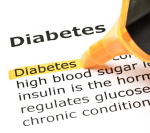
A • B • C • D • E • F • G • H • I • J • K
L • M • N • O • P • Q • R • S • T
U • V • W • X • Y • Z
Medical Tests
Definitions
A1c: A test that measures a person’s average blood glucose (blood sugar) level over the previous 2 to 3 months. The most accurate clinical name for this test is the HbA1c.
Hemoglobin is the part of a red blood cell that carries oxygen to the cells and sometimes joins with the glucose in the bloodstream. Also called hemoglobin A1C or glycosylated (gly-KOH-sih-lay-ted) hemoglobin, the test shows the amount of glucose that sticks to the red blood cell, which is proportional to the amount of glucose in the blood. Â Also called HbA1c, Hemoglobin A1c, and Glycosylated HbA1c.
Doctors use the A1c test to see how well a patient is managing their blood sugars over a several month period of time. Â The higher a patient’s A1c, the greater their risk for developing diabetes complications.
Acanthosis Nigricans (AN):  A skin condition characterized by darkened skin patches; common in people whose body is not responding correctly to the insulin produced by the pancreas (insulin resistance). This skin condition is also seen in people who have pre-diabetes or type 2 diabetes, PCOS and some thyroid conditions..
ACE Inhibitor: An oral medicine that lowers blood pressure; ACE stands for angiotensin (an-gee-oh-TEN-sin) converting enzyme. For people with diabetes, especially those who have protein (albumin) in the urine, it also helps slow down kidney damage.
Acesulfame: A dietary sweetener with no calories and no nutritional value. Also known as acesulfame-K. (Brand name: Sunett.)
Adhesive Capsulitis: A condition of the shoulder associated with diabetes that results in pain and loss of the ability to move the shoulder in all directions.
Adult-Onset Diabetes: Former term for type 2 diabetes.
AGEs: Stands for advanced glycosylation endproducts. AGEs are produced in the body when glucose links with protein. They play a role in damaging blood vessels, which can lead to diabetes complications.
Albumin: A protein normally found in the urine. Â Excessive amounts can indicate nephropathy (kidney disease).
Albuminuria: A condition in which the urine has more than normal amounts of a protein called albumin. Albuminuria may be a sign of nephropathy (kidney disease).
Alpha Cell: A type of cell in the pancreas. Alpha cells make and release a hormone called glucagon. The body sends a signal to the alpha cells to make glucagon when blood glucose falls too low. Then glucagon reaches the liver where it tells it to release glucose into the blood for energy.
Amylin: A hormone formed by beta cells in the pancreas. Amylin regulates the timing of glucose release into the bloodstream after eating by slowing the emptying of the stomach.
Amyotrophy: A type of neuropathy resulting in pain, weakness, and/or wasting in the muscles.
Anemia: A condition in which the number of red blood cells is less than normal, resulting in less oxygen being carried to the body’s cells.
Angiopathy: Any disease of the blood vessels (veins, arteries, capillaries) or lymphatic vessels.
Antibodies: Proteins made by the body to protect itself from “foreign” substances such as bacteria or viruses. People get type 1 diabetes when their bodies make antibodies that destroy the body’s own insulin-making beta cells.
ARB: An oral medicine that lowers blood pressure; ARB stands for angiotensin (an-gee-oh-TEN-sin) receptor blocker.
Arteriosclerosis: Hardening of the arteries.
Artery: A large blood vessel that carries blood with oxygen from the heart to all parts of the body.
Aspart Insulin: A rapid-acting insulin. On average, aspart insulin starts to lower blood glucose within 10 to 20 minutes after injection. It has its strongest effect 1 to 3 hours after injection but keeps working for 3 to 5 hours after injection.
Aspartame: A dietary sweetener with almost no calories and no nutritional value. (Brand names: Equal, NutraSweet.)
Atherosclerosis: Clogging, narrowing, and hardening of the body’s large arteries and medium-sized blood vessels. Atherosclerosis can lead to stroke, heart attack, eye problems, and kidney problems.
Autoimmune: Of, relating to, or caused by autoantibodies or lymphocytes that attack molecules, cells, or tissues of the organism producing them. In type 1 diabetes the immune system mistakes insulin producing beta cells as foreign (bad) cells and attacks and destroys them.
Autonomic Neuropathy: A type of neuropathy affecting the lungs, heart, stomach, intestines, bladder, or genitals.
Avandia: Avandia is the brand name of an oral insulin sensitizing drug used in treating diabetes. (Generic name: rosiglitazone.)


